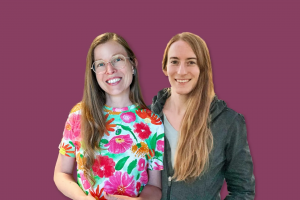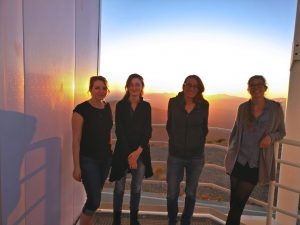
Ylva Gotberg and Maria Drout, Courtesy Leona Schwarz—Institute of Science and Technology Austria; Courtesy Tom Holoien/Maria Drout
By Ilana MacDonald, Dunlap Institute for Astronomy and Astrophysics, University of Toronto
The 2024 TIME 100 Next lineup was announced this week and among the individuals who are shaping the future of their fields was Associate Professor Maria Drout of the David A. Dunlap Department for Astronomy & Astrophysics at the University of Toronto, and Associated Faculty at the Dunlap Institute.
An expansion of the TIME100 list of the most influential people in the world, TIME100 Next highlights 100 emerging leaders who are shaping the future of business, entertainment, sports, politics, health, science and activism, and more. The full list and related tributes appear in the October 14, 2024 issue, available on newsstands on Friday, October 4, and now at time.com/next.
“I was honored (and quite frankly shocked) to be included on this year’s Time100 Next list,” says Drout. “It has been my great privilege to work with Ylva for the past 8 years and see both our careers and scientific ideas come to fruition.”
In collaboration with Assistant Professor Ylva Götberg of the Institute of Science and Technology in Austria, Drout devised a strategy to search for and identify a strange type of star whose outer layers of hydrogen have been stripped away, likely by a companion star. What is left is a hot helium star, that despite having long been theorized to be fairly common, have been remarkably difficult to find. Until recently only one candidate had been identified.
Drout and Götberg combined their theoretical and observational chops to first come up with a detailed model to help guide their search, and then went out and looked for these strange objects using both telescopes on the ground and in space. Their search yielded hundreds of candidates for these types of helium stars, 25 of which they studied in detail.
This discovery is especially significant as these types of stars are thought to be the progenitors of neutron star mergers and a type of helium-poor supernova explosion. Their results were published in the journal Science last year, and you can read more about this work in a previous post.
“This recognition is so richly deserved,” says PhD candidate Bethany Ludwig, who was also a contributing author on this discovery. “Maria Drout and Ylva Götberg are not only incredible advisors but also brilliant scientists. Working with them has been both inspiring and rewarding, and I feel incredibly fortunate to witness their brilliance firsthand. I, and the rest of the stellar astrophysics community, cannot wait to see what groundbreaking discoveries they will undoubtedly make next.”

Bethany Ludwig, Anna O’Grady, Maria Drout and Ylva Götberg, all authors of the paper describing the discovery, observing on the Magellan telescopes at Las Campanas Observatory in Chile. Credit: Ylva Götberg.
Drout is joined on the TIME100 Next list by notable individuals such as pop star Sabrina Carpenter, founding CEO of Springboard to Opportunities, an organization that aims to end generational poverty, Aisha Nyandoro, and the visionary behind Scale AI, a leading AI firm, Alex Wang. More than half of the individuals on this year’s list are women, and the majority are leaders of colour.
The individuals spotlighted on the list will convene at the fourth-annual TIME100 Next event on October 9, 2024 in New York City, where they will be celebrated for their achievements.
About the Dunlap Institute for Astronomy & Astrophysics
The Dunlap Institute for Astronomy & Astrophysics in the Faculty of Arts & Science at the University of Toronto is an endowed research institute with over 80 faculty, postdocs, students, and staff, dedicated to innovative technology, groundbreaking research, world-class training, and public engagement.
The research themes of its faculty and Dunlap Fellows span the Universe and include: optical, infrared and radio instrumentation, Dark Energy, large-scale structure, the Cosmic Microwave Background, the interstellar medium, galaxy evolution, cosmic magnetism and time-domain science.
The Dunlap Institute, the David A. Dunlap Department of Astronomy & Astrophysics, and other researchers across the University of Toronto’s three campuses together comprise the leading concentration of astronomers in Canada, at the leading research university in the country.
—–
For more information, contact:
Ilana MacDonald
Public Outreach, Communications & Events Strategist, Dunlap Institute
University of Toronto
ilana.macdonald@utoronto.ca
Josslyn Johnstone
Communications & Media Relations Specialist, Faculty of Arts & Science
University of Toronto
josslyn.johnstone@utoronto.ca
